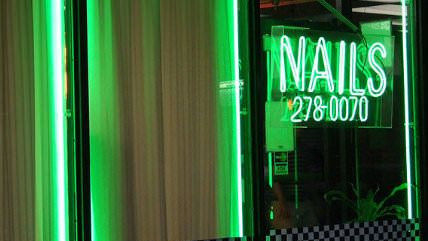Cuomo Reads Times Nail Salon Series, Starts Writing Lame New Regulations Posthaste
Reactionary policy tends to be bad policy.

New York Gov. Andrew Cuomo is introducing "emergency protections" for nail-salon workers, following a New York Times exposé last week on their low pay and possibly hazardous conditions. Is this an example of swift action to remedy an overlooked issue? Or reactionary politicians recognizing a good opportunity to grab power and PR points when they see it? To answer that question, let's consider who will actually benefit from the governor's nail salon decree.

Under the new rules, nail salons will be required to post notices in six languages about workers' rights—a move that probably falls in the won't help, won't hurt category. Another step will require salons to be bonded, "to ensure … that workers can eventually be paid if salon owners are found to have underpaid the workers" and also hide their assets from legal authorities. But what are the chances an owner who both eschews wage laws and engages in fraud are going to bother getting bonded? While this move is unlikely to add meaningful protection for workers, it will, however, drive up the cost of doing business for every nail salon in the state.
The biggest part of Cuomo's plan will send state and city inspectors into nail salons regularly, which may sound good in theory. He even promises inspectors won't inquire about workers' immigration status. Many of the women interviewed by the Times were in the country illegally, as well as working without the required state license for manicurists. Cuomo didn't say whether inspectors would be concerned with the professional licensing aspect. Regardless, putting law enforcement agents in increased contact with marginalized groups seldom works to their benefit. Week after week, I read stories about cities upping inspections of things like massage parlors and strips clubs. The stated reason is always noble: to ferret out human trafficking. But without fail these investigators wind up citing people for things like prostitution, building code violations, stripping without proper paperwork, and employing undocumented immigrants. The best laid plans of progressives and policymakers often play out very differently in the hands of government agents with quotas to meet, fees to collect, and a sense of personal purpose to fulfill.
Lastly, Cuomo will require all nail-salon workers to wear gloves and face masks, and salon owners to ensure proper ventilation. From the original Times articles, it seems like these simple steps could go a long way to improving worker safety and health—and be much more meaningful than the suggestion that the Food and Drug Administration simply ban nail-polish ingredients that aren't harmful with the right precautions. Again, I fear that the requirements will be used (like so many occupational safety rules are) to selectively harass and intimidate certain salons out of business, rather than as a small stick to encourage safe practices. But, in theory at least, this is the requirement that make the most sense to me.
Cuomo's office said they started drafting the new nail salon rules Thursday, the day the first New York Times nail-salon article was published. With all due respect to the impressive reporting therein, we ding college kids for writing research papers based on a single source. Do we really think it's prudent for politicians to write laws predicated on the same? Reactionary policy tends to be bad policy.
So does policy based on othering and exoticizing groups of people. On a HuffPost Live segment I participated in this morning, several of the other panelists critiqued the system wherein nail salon employees work solely for tips during weeks to months of training before receiving a regular wage, and sometimes must pay the salon owner for the training. Can you think of any other industry operating under such an exploitative system?, the host asked. They could not.
But what about internships—many of which involve unpaid work without so much as a promise of employment thereafter? What about the wannabe stylists at fancy, organic Aveda salons, who also work for nothing but tips during their training period? What about people who pay school tuition plus an up-front cut to the state for licensing before being permitted to work? How is that scenario any different than paying a small business owner in the community to train you directly? In general, we recognize that people may choose to do all of these things, however suboptimal, based on a rational assessment of future benefits. Here's a snippet from my post last Friday on the issue:
Would workers be better off with no jobs or means to support themselves? Living back in their home countries? Maybe in some cases, yes, but we don't know because we are not them. And I tend to believe that immigrant salon workers, being as intelligent and rational as the rest of us, are capable of weighing their own interests and situations and acting accordingly.
It was the most criticized part of my post by liberals on social media. Is it bad to be a slave? We don't know, we're not them!, folks mocked.
But we're not talking about slavery or involuntary servitude. We're talking about people who choose, every day, to go into these jobs. They might not have a lot of other options (thanks in part to U.S. immigration policy), but it's insulting to those who've had to endure the horrors of slavery to say women getting paid in tips are slaves.
There is certainly value in recognizing the acknowledging the effects of power differentials and privilege. These's also risk in reading too much into them. When you see the same practices as unconscionably exploitative in foreign or unfamiliar communities that you see as standard in your own, you might be perverting privilege theory to play savior. At the very least, you might not be thinking these issues through. It feels good to say, "This is bad. Let's send the government in to stop it." It does good to actually consider the unique needs of underprivileged communities, the reality of their interactions with law enforcement, and the unintended consequences of sending the ultimate power differential (state power) their way. I'm seeing way too many people content to stop at step one.


Show Comments (87)